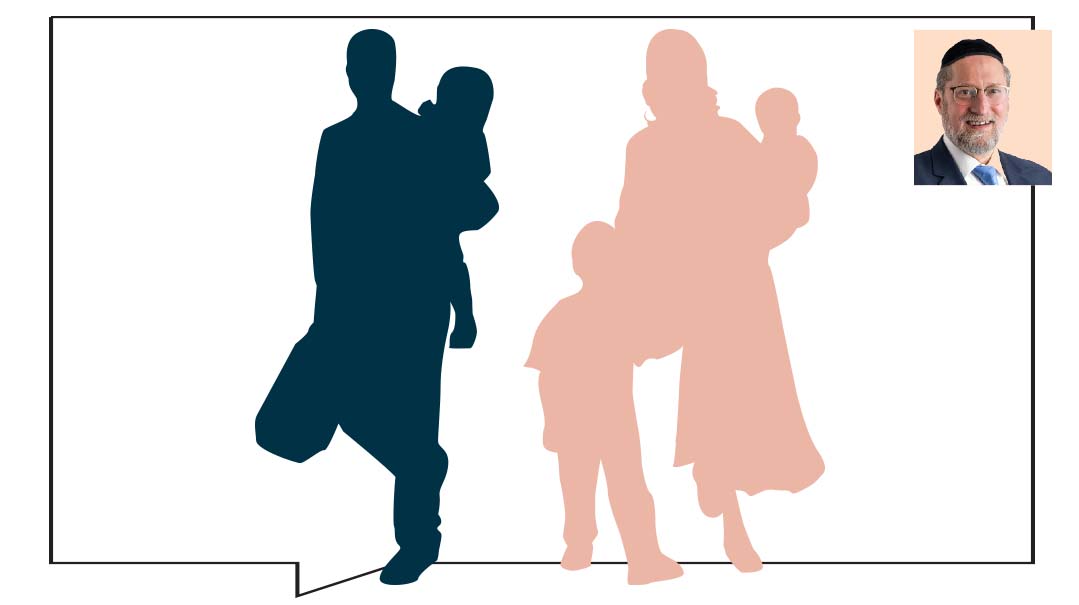My Siblings Dont Like My Husband
| November 23, 2021Your job is to be there for your spouse. To stand by their side, be on their team, regardless of what anyone else may think or say about them.

Written with Zivia Reischer
I have a question for you. I’ve been married for five years already, but every time we visit my parents for Shabbos or Yom Tov, the same problem crops up. I guess my siblings don’t really like my husband because they’re always finding fault with everything he says or does. Whatever he says, they’ll put him down, making it sound like he’s not worldly or like he’s an am-ha’aretz. If we’re talking about something related to finances, they’ll say to me, “I hope you don’t rely on Yaakov to make financial decisions.” If we’re considering a vacation, and I tell my sister which destination my husband suggested, she’ll say, “You’re going to let him plan your trip?” They pick on everything he does — his table manners, his clothes, whatever he does or doesn’t do — and make fun of it. When I once tried to talk to them about it, it quickly escalated into a full-scale confrontation with outright insults toward my husband. Am I supposed to just ignore their behavior? Am I supposed to stop visiting? I love my husband, and I love my parents and siblings, and I feel caught between them. What am I supposed to do?
I cannot emphasize enough the importance of having a rav that you turn to with questions.
This goes for everyone — every family needs a rav, every couple needs a rav, every individual needs a rav. Throughout life, there will be many situations where you need advice or direction, and the ability to consult with a rav is an invaluable tool, especially for shalom bayis. Not only does a rav provide you with the impartial and wise perspective of a person more learned than yourself, it’s also easier to receive the advice coming from an outside party (rather than from one’s spouse). In your case, a rav can help you identify if in fact there really is something wrong and your family members have a legitimate point that needs to be addressed. I highly recommend that you seek advice from someone who knows you both well.
But let’s assume that there isn’t something really wrong, and this is a case where certain personalities just don’t mesh with other personalities. Simply put, your husband and your siblings get on each other’s nerves. In that case, I would like to share with you a very important perspective.
Your marriage comes first — before anything else. Before work, before social obligations, before learning, and before community responsibilities. Your marriage also comes before any other relationship: before your brothers and sisters, before your aunts and uncles, even before your parents and in-laws.
The Torah says, “Therefore, a man leaves his father and mother, and clings to his wife” (Bereishis 2:24). That means that any time there is a conflict of interest, your primary obligation is to your spouse. Your spouse comes first.
In this case, if your siblings and your spouse don’t get along, you support your spouse. You are on his side. You are at his side. Remember: You are best friends who love each other.
What if you agree with your siblings? What if your spouse really did say something dumb or really does have an annoying habit?
You still support your spouse. And support means you are deaf, dumb, and blind to the things your spouse does wrong. If your spouse messes up, you don’t notice it. In fact, here is a formula for a happy marriage: Be deaf, dumb, and blind to your spouse’s flaws. You don’t see them. You aren’t aware of them. You don’t even know they exist. If you choose to be alert, attuned, and focused on your spouse’s flaws, you will be miserable (and so will your spouse).
While you remain a member of your birth family, you have now created your own family together with your spouse, and that is where your loyalties lie. Most people get that in theory, but it’s not always simple or easy in practice. Your role is to support your spouse because you are best friends who love each other.
Your job is to be there for your spouse
This is a common mistake that many couples make — they forget that their spouse comes first.
This concept of you and your spouse being one unit, facing the world as a team, is one of the foundations of a successful marriage. Unfortunately, it’s not uncommon for one’s spouse to get into a spat with someone from your family of origin. If your spouse is right and your sibling is wrong, it’s obvious and easy to support your spouse — even if your sibling gets angry at you, even if your sibling says she’ll never speak to you again, and even if she really does in fact never speak to you again. The more difficult problem is when you know that your spouse is not right. Even then, you’re still on your spouse’s team. And this attitude has to be something that you not only demonstrate to others but you actually integrate into your own thinking.
Yaakov and Sheva are at his parents’ house and Yaakov’s mother starts to criticize Sheva’s housekeeping. It’s not the first time this has happened, and Yaakov delicately tries to redirect the conversation. It doesn’t work. His mother continues to berate his wife for not keeping the house cleaner and more organized. Yaakov tries again to change the subject. It doesn’t help. Seeing no other option, Yaakov defends his wife, asking his mother to please not speak to her that way.
He tried his best to avoid it, and it was mighty uncomfortable, but there was no other choice. He did the right thing.
When they come home, he says, “You know, Sheva, I defended you because my job is to defend my spouse, but I want you to know, my mother is right.”
He just undid everything he did right.
But everything my mother said is true. The house really is a huge mess all the time. That may be true, but it’s not your job to fix your wife. That may be your job if you were her mentor or rav, but as a friend, your job is to be supportive.
But who’s going to teach her?
Not you.
But how’s she going to learn?
Not from you.
Mark Twain had a line about success in life: “All you need is ignorance and confidence.” Most people walk into marriage very ignorant and very confident. But in their confidence, they are also very ignorant of the damage that they are doing to their relationship. If your spouse does something wrong, your job is not to teach them.
But you said we’re friends. Don’t friends help each other?
If your spouse asks you for help, maybe. But unless your spouse explicitly asks, “What do you think about my behavior?” don’t even think of volunteering your opinion. Even if they do ask, the wisest course would be to keep your thoughts to yourself and your mouth shut.
But that’s so dishonest.
For shalom bayis it’s permitted to lie.
People hate criticism. Men, women, kids, adults, everyone. No one likes unsolicited advice. No one likes disapproval — even if it’s subtle and worded carefully. One of the quirks of human nature is that the more wrong I am, the less I want to hear it. And if you let me know I’m wrong, I can’t help but feel that you’re not my friend. You’re not my support. You’re not on my side.
Your job is to be there for your spouse. To stand by their side, be on their team, regardless of what anyone else may think or say about them.
Rabbi Bentzion Shafier is the founder of TheShmuz.com, a life-changing mussar shiur that is available on TorahAnytime, The Shmuz Podcast and The Shmuz App. His newest book release, The Ten Really Dumb Mistakes That Very Smart Couples Make, is available on TheShmuz.com and will hit Jewish bookstores later this year.
Note: This column is intended to offer an understanding of the mechanics of a good marriage. In situations of chronic abuse, a qualified professional should be consulted.
(Originally featured in Mishpacha, Issue 887)
Oops! We could not locate your form.







